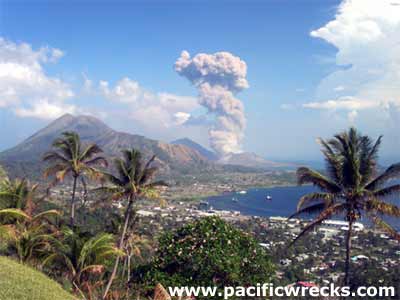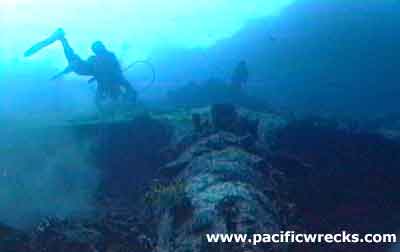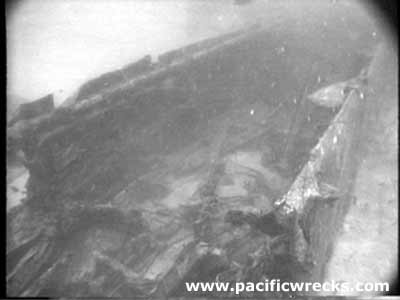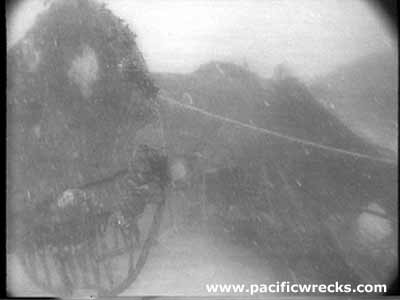November 2002. After a week's delay waiting
for the boat and spare parts, the expedition proceeded down
the
coast
where it discovered an A6M5
Model 52 Zero that went down off
Mongo village in Jammer Bay. Unfortunately the fighter showed
no signs of battle damage and the pilot had escaped.
The expedition continued along the south coast
of New Britain, taking shelter as it went from unseasonable
southeaster winds
and heavy seas. We spent time at AWO mission (UWOL today) where
a twin engine US bomber reportedly crashed into the sea and at
Lindenhafen Mission a Jap seaplane base. Lindenhafen is within
sight of Gasamata a major Jap fighter base. After making repairs
at Lindenhafen a break in the weather allowed the crossing of
100 miles of open ocean to the primary objective of this expedition
to B-24D "Crosair" 41-23752 that ditched off Kawa island on January 1, 1943 with the
loss of two of its crew.
The 319th, 90th Bomb Group borrowed "Crosair" from
the 320th Bomb Squadron for a single plane raid on Vunakanu
Air Drome near Rabaul. Crosair was lost returning from the
mission.
The Aircraft had departed Iron Range, Australia on the 31st
December and staged through Port Moresby. There is one MIA
on board Sgt Carol E. Domer the tail turret gunner.
After attacking Vunakanu
Crosair turned south at 9,000 feet. Approximately one-hour
later No. 4 engine quit and could not
be restarted. Soon after No. 4 failed No. 3 engine also quit.
Suddenly, from 9,000 feet Crosair was down to 500 feet over
St George's Channel and barely maintaining air speed. Orders
to
bail out were rescinded. All guns, ammo, parachutes, etc were
jettisoned, as Crosair headed to Milne Bay.
Dawn found Crosair
with Kawa Island off to port when the No. 1 and 2 engines
ran away and had to be shut down after the
governors gave out. Major Kuhl put the plane into a steep
glide, leveling
out skimming the surface before impacting tail first.
The survivors got into two life rafts; landed on Kawa Island
where the Aussie Army Spotters stationed there met them.
From there they boarded a motor launch and headed south to
rendezvous
with a Sunderland flying boat at Goodenough Island, then
flown to Milne Bay. On the way to Goodenough one of the severely
wounded succumbed to his wounds. The surviving crew was later
flown back
to Iron Range.
Rod Pearce owner & captain of MV Barbarian
II, the expeditions base of operations had first heard about
Crosair while looking for another Aircraft, an Australian Beaufort
Bomber A9-217 in the same area of the Trobriand Islands.
An Australian army spotter's cook "boi" told Rod a
story of another plane that crashed and 10 to 12 people got out
of the sinking wreck and with the locals helping them ashore
on the tiny island of Kawa. He named the plane as a Liberator
and after that Rod thought there was a good chance of finding
it.
After finding Beaufort A9-217 and assisting the RAAF in recovering
the MIA's on board, Rod made several attempts to find Crosair
with
the plane finally being located on January 12, 2002.
Crosair rests upside down on a very white sandy bottom in 100' of water. The entire bottom of the plane was torn out during
the ditching. The tail section is nearly torn free attached to
the fuselage by the roof. The ditching folded the tail section
over onto the back of the plane. The control surfaces now face
forwards. The wings are in perfect condition as well as the engines.
Very little coral has formed on the entire plane; machine guns
still protrude from the nose of the aircraft.
Four of the nine
crewmembers that escaped are still alive. Video of Crosair and
still photos of the expedition were sent to the
surviving crew and family members.
The islanders sadly to say
are not fairing well; we found them suffering from thirst
and malnutrition. Their crops had failed
after five months without rain. They were grateful for fish
and 60 kilos of rice we presented as a gift. As we were preparing
to leave a relief ship called on Kawa with sorely needed supplies.
Also, B-24D "Cowtowns Revenge" ditched 15 miles
west of Kawa Island just off Islet Island. Survivors and rescuers
have been interviewed, but that's another story. |





